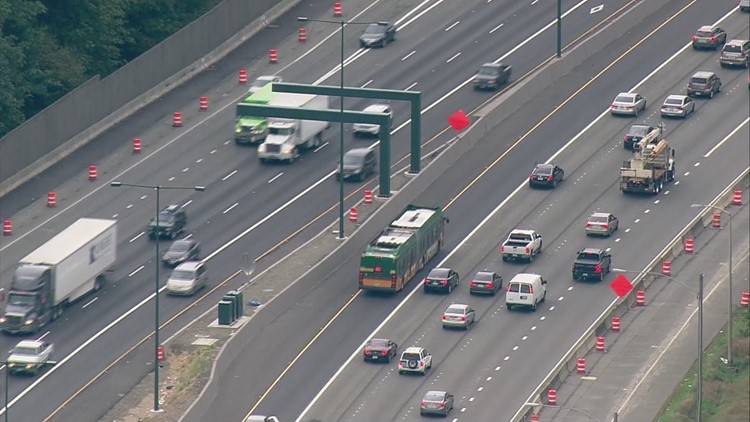A transportation task force is recommending Washington state form a new Central Puget Sound Transportation Authority to manage area projects and initiatives. It also recommends the state pursue a pay-by-mile road usage fee to fund future transportation projects.
KING 5 obtained an exclusive copy of the yet-to-be-released report by the Puget Sound Regional Council.
The Transportation Futures Task Force was composed of 16 national, local and regional leaders with an interest in transportation around the Puget Sound.
They included King County Executive Dow Constantine, Seattle Mayor Ed Murray, Tacoma Mayor Marilyn Strickland, and Starbucks Chief Creative Officer Arthur Rubinfeld.
The group met throughout 2015 to examine the major challenges to transportation funding and make recommendations.
“Even as major capitol projects are underway — and more are on the way— our ability to make investments isn’t keeping pace with an expected million more people and 50 percent more jobs,” the report said.
Freeway delays increased 95% around Puget Sound between 2010 and 2015, according to the Washington State Department of Transportation and those delays may only get worse without intervention.
![635936462718295618-FullSizeRender-2.jpg [image : 81814496]](http://cdn.tegna-tv.com/media/2016/03/15/NWGroup/KING/635936462718295618-FullSizeRender-2.jpg)
The group identified a $36 billion shortfall in funds needed for future transportation demands.
Traditionally, federal and state transportation funds are generated by a fuel tax, but data form the WSDOT shows diminishing returns.
Since 2001, state fuel tax revenues are down 46%, when adjusted for inflation.
![635936462184612776-FullSizeRender.jpg [image : 81814456]](http://cdn.tegna-tv.com/media/2016/03/15/NWGroup/KING/635936462184612776-FullSizeRender.jpg)
“Despite raising state gas taxes several times over the last decade or so, structurally those gas taxes are going to buy less over the long term and we need to replace that,” says Ben Bakkenta, Puget Sound Regional Council program manager. “We see a real deficiency in the way we anticipate funding transportation."
The task force blamed fuel efficiency, a gas tax not indexed for inflation, and changes in driving habits as reasons for the decline.
It examined multiple alternative funding options including the expansion of tolling, a road usage charge, and a carbon tax.
Only the road usage charge, or pay-by-mile fee, received high marks across all four guiding principles related to sustainability and equity.
Local jurisdictions are expected to need $26 billion for the maintenance of 30,000 lane miles of roadways and 800 bridges through 2040, according to the task force.
An additional $23 billion will be needed for expansion and $19 billion for local transit.
While larger state projects, such as the Interstate 5 and Interstate 405 corridors, have obtained funding through the latest state transportation package, PSRC’s Ben Bakkenta says in some ways local and regional projects have been left out.
Bakkenta hopes the formation of a Central Puget Sound Transportation Task Force would better help local and county agencies secure creative funding and coordinate projects to insure these roadways aren’t left behind.
“The task force recognized a critical gap in financing for local and county roads,” Bakkenta said. “A lot of these state gas taxes we have been raising have been pledged to pay off bonds for large state projects, so less is filtering down to the local level."
“Greater coordination, leveraging different sources of revenue will be really important over the long term... and to make sure we are prioritizing different projects sufficiently,” Bakkenta said.
To demonstrate the task force’s support of a exploring a state pay-by-mile fee to fund transportation projects, the task force obtained permission to transfer around $500,000 from a roughly $1.7 million federal grant to the Washington State Transportation Commission.
The commission will use that money to prepare for the ultimate launch of a state pilot project that will examine the potential of a pay-by-mile fee.
“Like utilities, like your phone bill, like your water rates -- paying for what you use in transportation,” Bakkenta said. “People really aren’t paying for their direct use of transportation today."



![635911810455866608-I-5.JPG [image : 80439746]](http://cdn.tegna-tv.com/-mm-/3e72c61d7568da02b25ac811f74201d124a95272/c=518-0-1778-1077/local/-/media/2016/02/16/NWGroup/KING/635911810455866608-I-5.JPG)
